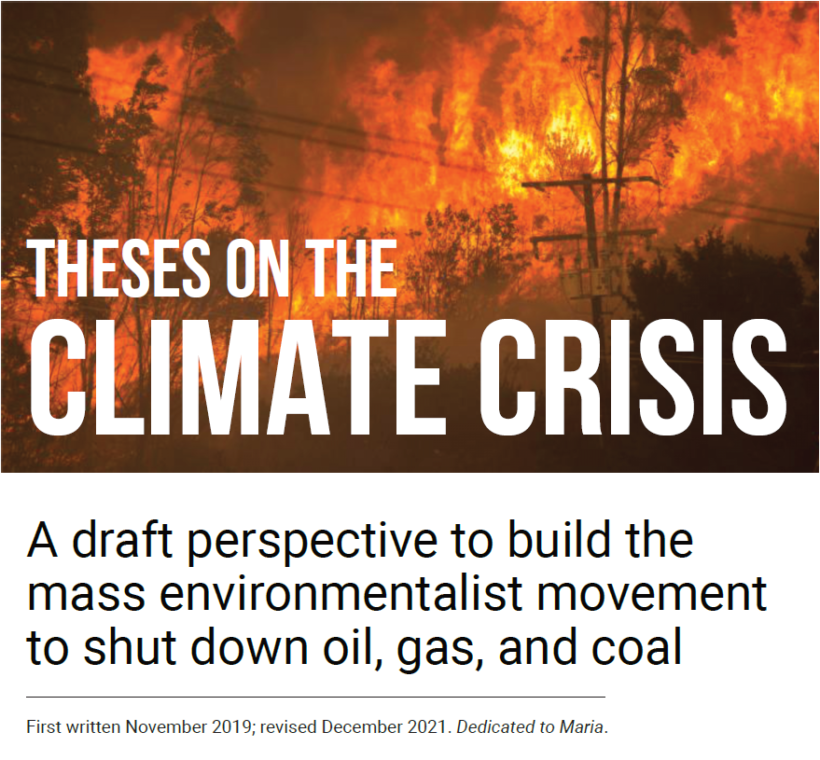
December 2019 BAMN’s draft outline to the American Geophysical Union (AGU) Conference
This perspective is not addressed to the fossil fuel corporations, nor to the politicians, who have failed to protect humankind against the climate crisis. To solve the crisis, it is necessary for today’s environmentalist movement to assert itself in a bold and new direction.
This perspective for a mass movement is based on the civil rights and immigrant rights work of BAMN, the Coalition to Defend Affirmative Action, Integration & Immigrant Rights, and Fight for Equality By Any Means Necessary. BAMN represents the struggle of the millions of people who are fleeing from the hottest parts of the world in search of refuge and freedom, and the struggle of all people who face discrimination and persecution. Facing this crisis for life on earth, BAMN turns to the masses of people who are fighting to survive.
This perspective is addressed to them.
- The climate crisis presents an imminent threat to the existence of humankind.
1.1 The overwhelming consensus of the scientific research is definitive, irrefutable, and deathly serious. Since the Industrial Revolution, the buildup of greenhouse gas pollution has trapped increasingly more of the sun’s heat within the earth’s atmosphere, raising the overall temperature of the planet. This global heating process destabilizes the environmental conditions upon which human beings depend for our survival. This phenomenon has been and continues to be researched, documented, and proven exhaustively. Scientists have played the heroic role of alerting society to the crisis and consistently defending this scientific truth against repeated and ongoing attacks from the polluting industries.
1.2 Today, the climate crisis is far more than a scientific theory—it is a glaring reality that is already devastating millions of lives through a series of disasters. Rising sea levels, severe flooding and droughts, the submersion of coastal cities and entire islands, massive wildfires, volatile fluctuations in weather, increasingly frequent and catastrophic hurricanes and deadly weather events, the melting of the arctic icecaps accompanied by polar vortex conditions, the mass extinction of plants and animal species, the destruction of agriculture, and the forced migration of millions of people escaping unlivable circumstances—these are some of the known consequences of the climate crisis. Each passing day yields new evidence that those consequences are growing worse.
1.3 This global heating is rapidly progressing towards a decisive “point of no return,” a point at which the heating of the earth becomes irreversible and escalates the earth’s temperature to a super-hot condition that, if reached, would result in the extermination of humankind.
- All measures to mitigate the climate crisis thus far have failed miserably, while the rate of global heating has only accelerated.
2.1 Under the current regulatory policies of the world’s governments, greenhouse gas emissions are not only increasing, but are actually accelerating at a record yearly growth. The rise in the earth’s temperature continues to accelerate, as well, at a rate which is even faster than the projections of many scientific models—models which are meant to predict the level of heating that would occur without any regulatory intervention. Oil, gas, and even coal continue to be growth industries in spite of new technological developments and increased energy efficiency.
2.2 World leaders have made grand displays of political pageantry regarding the climate crisis, but have categorically failed to implement any solutions. The scientific consensus is that the recent Conference of the Parties in Glasgow, or COP26, accomplished nothing. Even in the non-committal, non-binding language of the COP26 resolution, the Conference agreed to amend the words “phase out the use of coal” to instead read “phase down the use of coal.” Just days after COP26 was over, President Biden conducted the largest ever auction of oil and gas drilling leases in the Gulf of Mexico, selling 80 million acres to the oil industry.
2.3 The much-celebrated “Paris Agreement,” produced by COP21, is all but dead. That agreement proposed the goal of limiting global temperature increase to less than 1.5°C above preindustrial levels. But at our current rate of heating, the earth is projected to reach that temperature by the year 2032 and it is now a virtual certainty. This is an emergency, and it is clear that we cannot solve that emergency using only the measures that world leaders have found acceptable so far.
- A pervasive, fatal flaw has doomed all previous and existing government measures regarding the climate crisis: their obstinate reliance on “market-based” solutions which invariably leave the oil, gas, and coal industries intact.
 3.1 Despite their ineffectiveness, nearly every major government in the world can claim to have “taken action” to address the climate crisis in some way, and those actions have various names and forms: environmental protections, maximum emissions quotas, cap-and-trade, taxes on pollution, clean energy initiatives, etc. Likewise, many of these governments have their own regulatory agencies that enforce environmental laws and policies on a daily basis. This can give the false impression that these governments have done a great deal to mitigate the climate crisis. It is therefore important to explain why, in spite of such regulatory measures, the empirical data on the climate shows that the heating of the earth proceeds at such a pace as though nothing at all has been done to stop it.
3.1 Despite their ineffectiveness, nearly every major government in the world can claim to have “taken action” to address the climate crisis in some way, and those actions have various names and forms: environmental protections, maximum emissions quotas, cap-and-trade, taxes on pollution, clean energy initiatives, etc. Likewise, many of these governments have their own regulatory agencies that enforce environmental laws and policies on a daily basis. This can give the false impression that these governments have done a great deal to mitigate the climate crisis. It is therefore important to explain why, in spite of such regulatory measures, the empirical data on the climate shows that the heating of the earth proceeds at such a pace as though nothing at all has been done to stop it.
3.2 All existing government climate regulations are “market-based.” These regulations may “incentivize” the use of clean energy such as solar and wind power, or “disincentivize” the use of fossil fuels, but they do not directly impose upon the buying and selling of oil, gas, and coal. Taxes and emissions regulations are meant to discourage the use of fossil fuels, while subsidies offset the cost of building clean energy technology. These policies are considered “market-based” because they do not interfere with the proprietorship or the economic activity of the fossil fuel corporations.
3.3 The fossil fuel corporations regard it as their right to own, to produce, to buy and to sell fossil fuels. “Market-based” policies defend these business practices as fundamental freedoms that cannot be abolished. Under all such policies, the fossil fuel industries freely continue selling oil, gas, and coal… and that is the only real purpose of the market-based regulatory measures.
- In order to resolve the climate crisis, it is necessary to expropriate the oil, gas, and coal industries for the purpose of shutting them down.
4.1 Given what may be the shortest leap of logic ever required to address any problem of great magnitude, it is frankly an outrage that there are so few scientists—and virtually no political leaders—who are willing to speak it publicly. The logic proceeds something like the following: (a) in order to stop the overheating of the climate, it is necessary to eliminate the global emissions of carbon dioxide; (b) eliminating carbon emissions requires the elimination of oil, gas, and coal as sources of fuel; (c) eliminating the use of oil, gas, and coal would obviously entail that those industries would go out of business; (d) the oil, gas, and coal industries show no measurable market indications of going out of business anytime soon and have no intention to do so willingly; (e) therefore, it is necessary for the oil, gas, and coal industries to be shut down. It is the unavoidable logic that has transpired in private conversations between scientists and environmentalists for decades; it must become the publicly stated program for saving humankind.
4.2 Expropriation has a dual purpose: both to shut down the fossil fuel industries, as well as to finance the production of clean energy and the equipment that will run on clean energy as a fuel source. Expropriation should require the confiscation of all material and financial assets of the fossil fuel industries by the national government, the conversion of those assets into public utilities, and the rapid reallocation of those assets to rebuild the energy infrastructure on a clean basis. It is important to note that the great bulk of the accumulated wealth of those industries exists in the form of finance capital and is controlled by investors and bankers—expropriation must also be applied to those titan financiers. The program for the fossil fuel industries should be straightforward: expropriate, reallocate, eliminate.
4.3 Expropriation is regarded as an extreme measure under capitalism, and it certainly is. But the justification for it is easy enough for anyone to comprehend. The fossil fuel corporations do not have the right to destroy our home and our species. After decades of causing wars and senseless bloodshed for oil, these industries now threaten the lives of all of humanity, indiscriminately. It is time to end all market-based maneuvers and take fossil fuels off the market, permanently.
- Expropriation of the oil, gas, and coal industries is necessary for economic reasons, because the fundamental laws of the market dictate that the profitability of fossil fuels will otherwise prevail against the prohibitive costs of rebuilding the entire global infrastructure on a clean-energy basis.
5.1 Oil, gas, and coal are increasingly profitable and will continue to be profitable so long as any sizeable portion of the world’s technology will run on them. Oil and gas, in particular, have experienced a massive revival due to two recent, historic developments. First, the successful development of hydraulic fracturing technology, or “fracking,” has created a boom for the U.S. oil industry, unlocking vast potential for efficiently accessing hydrocarbons at incredible depths. Second, the melting of the arctic icecaps—one of the effects of the planet’s overheating—has also consequently opened up access to the world’s largest untapped oil reserves, in Russia’s backyard. The intrinsic profitability of these fossil fuels ensures that they will continue to be used and sold until the global economy can be reconstructed on a clean energy basis.
5.2 While solar and wind power are free, the cost of converting the entire global infrastructure to run on them is not. Every household, factory, and office building; every piece of machinery, every vehicle, and every appliance that runs on fossil fuels; all of the gargantuan accumulation of technology that relies upon oil, gas, and coal—all of it must be adapted, rebuilt or replaced. It would be the largest and quite necessarily the fastest reorganization of the global economy in all of human history. And it won’t be cheap. Such a reorganization may likely require sinking the entire accumulated wealth of the fossil fuel industries just to pay for our continued existence.
5.3 It sounds almost too obvious to require saying, and yet it must be said: there is absolutely no laissez faire market mechanism that will result in abandoning billions of dollars of potential profits underground while spending billions of dollars to build solar panels, windmills, and new energy infrastructure. The market will not solve the problem. The market is the problem.
- Expropriation of the oil, gas, and coal industries is necessary for political reasons, because the wealth and power of those industries is otherwise sufficient to purchase politicians wholesale and take over entire governments, thereby undoing all previous environmental policies which fall short of expropriation.
 6.1 Political corruption is a pervasive reality that cannot be ignored. When President Donald Trump moved into the White House, the fossil fuel industries moved in with him. The State Department and the Environmental Protection Agency fell under the control of oil and coal executives. Seemingly every pore of the government became infested by corporate parasites sucking from the national treasury. The modest environmental regulations put forth by the previous Obama administration, which proved insufficient to mitigate the climate crisis, were nonetheless obliterated with the stroke of a pen.
6.1 Political corruption is a pervasive reality that cannot be ignored. When President Donald Trump moved into the White House, the fossil fuel industries moved in with him. The State Department and the Environmental Protection Agency fell under the control of oil and coal executives. Seemingly every pore of the government became infested by corporate parasites sucking from the national treasury. The modest environmental regulations put forth by the previous Obama administration, which proved insufficient to mitigate the climate crisis, were nonetheless obliterated with the stroke of a pen.
6.2 This is the political result of “market-based” environmental regulations. Any measures that leave the fossil fuel industries intact, permit the possibility that all such regulations can be undone by the next administration. Expropriation, on the other hand, is a means of depriving the fossil fuel industries of exactly this possibility.
6.3 Grass-roots environmentalists cannot compete with the wealth and influence of the fossil fuel industries—let alone the manufacturing sector—on a regular electoral basis. No nation on earth has managed to enforce even modest emissions regulations consistently and effectively. This means that any theory of gradualism is politically unviable. Each swing of the political pendulum could undo all previous gains, feeling like a ticking doomsday clock counting down to the end of human history. This pendulum is swinging back and forth with increased volatility, and the environmentalist movement must seize every promising moment. Expropriation must be implemented at the first opportunity; it must be done swiftly and thoroughly.
- To achieve the expropriation of the oil, gas, and coal industries, it is necessary to build a mass environmentalist movement that is independent from all political parties which rely upon corporate funding—a mass movement that builds its alliances among all those who suffer under the oppression of the oil, gas, and coal oligarchs.
7.1 More than a decade ago, environmentalists watched with hopeful enthusiasm as former Vice President Al Gore and other celebrity reformers sought to persuade world leaders and corporate executives of the need to address the climate crisis. Under today’s political conditions and worsening climate, that hopeful period looks naively utopian in hindsight. The celebrity reformers, along with their method of appealing to the rich and powerful using the handy tools of rational arguments and moral persuasion, achieved nothing. Or, insofar as the planet can report, less than nothing.
7.2 The corporations would only embrace environmentalism as part of a public image for themselves, as an advertising gimmick, and as a means of avoiding scrutiny for their crimes. All of the worst polluters began promoting themselves as environmentally friendly, with the eager assistance from many environmentalists who were overjoyed to have friends in high places. Through this process, just as the official leaders of the environmentalist movement seemed to be ascending to the top of society and gaining influence, they were actually descending into corruption and becoming part of the problem that they had purported to solve.
7.3 The lessons of the old movement are painfully clear: environmentalists must not step into the trap of adapting to the corporate “allies” or their political mouthpieces. New leaders must step forward to carry the movement beyond its old shortcomings. Independence from corporate interests, independence from the politicians and political parties who rely on corporate funding, is imperative for the movement to be able to speak with its own voice and assert its own demands. Otherwise, the movement will only continue ineffectually seeking progress through the same kinds of market-based measures that have not worked and will not work. The leaders of the movement must speak the plain truth: the oil, gas, and coal industries must be shut down.
7.4 Someone cries out, “But without our super-special-important corporate friends, what shall we do?” The answer: find better friends. Just take a look around—look at the trail of human destruction that has been wrought by this crisis, and you will find along that trail millions of people, bloodied but not broken, who want to survive and are looking for leadership. Look to the new generation of youth, who are not willing to accept that the end of the world must arrive before their own lives have barely begun. Look to the freedom fighters who are trying to save their democratic rights from the tyranny of oil oligarchs in authoritarian governments. Look to the poor and oppressed who have no stake in monopoly capital and no businesses from which to profit. And look to the millions of immigrants and refugees, fleeing from the hottest parts of the world and searching desperately for freedom, for a home. These are the real friends of the environmentalist movement; these are the real allies. From that trail will emerge the greatest and most committed leaders that the movement has ever known. And from those friendships, may we all find new reasons why life is worth living, and why humankind is worth saving.
- The mass environmentalist movement must unite in alliance with the global struggles to defend democracy and to stop the rise of authoritarian and neo-fascist regimes.
 8.1 For many years, environmentalists in the United States and Europe have taken for granted an asset that cannot be taken for granted anymore: a free and democratic government through which it might be possible to make the case for solving the climate crisis. Today, democracy is under attack even in the places where it was presumed to be the most secure.
8.1 For many years, environmentalists in the United States and Europe have taken for granted an asset that cannot be taken for granted anymore: a free and democratic government through which it might be possible to make the case for solving the climate crisis. Today, democracy is under attack even in the places where it was presumed to be the most secure.
8.2 Neo-fascist movements and politicians have risen to prominence in the United States and many European nations, creating the real threat of authoritarian rule. Amid this bizarre concoction of anti-immigrant demagogues, white supremacists, business tycoons, and astoundingly deranged egomaniacs, there are also a few relatively stable elements that can be distilled—notably the influence of big oil. Fossil fuel companies are more than willing to support authoritarian government if that is what it takes to hold onto their businesses. As a matter of fact, in nations where oil is by far the dominant industry, such as Russia, authoritarian rule is the norm.
8.3 The threats to democracy are real and immediate. The environmentalist movement must not sit on the sidelines. In this fight, the environmentalist movement can join forces with necessary allies, gathering new strength and momentum in the effort to solve the climate crisis. And the environmentalist movement must likewise give its full strength to the struggle for democracy, or else the dangers for human existence magnify exponentially. The task of overthrowing any polluting industry is tremendously difficult even under the most free and democratic conditions—that task becomes immeasurably more difficult if it requires overthrowing an authoritarian government, as well.
- The mass environmentalist movement must unite in alliance with the global struggles for immigrant rights and for the liberation of the neo-colonial “third world” nations.
 9.1 Sometimes traveling on foot for hundreds of miles, and in other cases stowed away in tight cargo spaces with scarce air circulation; often making the journey in large caravans of hundreds of people, but even braving the difficulties alone without assistance when there is no other option; traversing hot deserts, burrowing under fences, climbing over walls, crossing rivers in makeshift rafts or just by swimming, crossing the Mediterranean Sea, carrying no possessions other than hope and courage, and somehow finding the determination to keep pressing forward to a foreign land in the quest to find freedom—the largest and most extraordinary migration of people since World War II is both the most heartrending evidence that the world is changing, and is also one of the most profound events that is itself changing the world. Millions of immigrants experience the world as though living outside of society, and yet are actually at the very center of everything significant that is happening right now—the immigrants and refugees of today’s crisis are the people whose struggle for existence is likely to be determinative for the existence of every other human being on the planet. Whether the outcome of this struggle is liberating or tragic, the rest of the world will share the same fate.
9.1 Sometimes traveling on foot for hundreds of miles, and in other cases stowed away in tight cargo spaces with scarce air circulation; often making the journey in large caravans of hundreds of people, but even braving the difficulties alone without assistance when there is no other option; traversing hot deserts, burrowing under fences, climbing over walls, crossing rivers in makeshift rafts or just by swimming, crossing the Mediterranean Sea, carrying no possessions other than hope and courage, and somehow finding the determination to keep pressing forward to a foreign land in the quest to find freedom—the largest and most extraordinary migration of people since World War II is both the most heartrending evidence that the world is changing, and is also one of the most profound events that is itself changing the world. Millions of immigrants experience the world as though living outside of society, and yet are actually at the very center of everything significant that is happening right now—the immigrants and refugees of today’s crisis are the people whose struggle for existence is likely to be determinative for the existence of every other human being on the planet. Whether the outcome of this struggle is liberating or tragic, the rest of the world will share the same fate.
9.2 The regions of the world from which people are fleeing in exodus—primarily Africa, Central America, and the Middle East—are also the hottest parts of the world, and are experiencing the effects of the global heating process more acutely than their northern neighbors. These regions of the world are also poorer, and serve as neo-colonial outposts for the richer nations. They are subjugated by wars and violence during the worst of times, and are subjugated by finance capital during the intermissions. Due to the most parasitic phenomenon of market economics, as more and more finance capital is invested in these regions, the poorer they become. Global heating has greatly increased their poverty. Yet in these regions’ long and dramatic histories of hardships and struggles for liberation, today’s crisis marks the first time that the struggle for human freedom has overwhelmingly taken the form of escaping these regions, altogether.
9.3 The arrival of the mass migration within the imperialist nations has become the most consequential political dynamic at every destination, changing the very social fabric of each national landscape. But that arrival has also put on display the real relationship between the imperialist nations and the neo-colonies. The journey of the mass migration, which had originated from the hottest nations on earth, increasingly arrived to the most chilling reception—held captive in concentration camps, confined in small cages, shackled in prisons, and funneled through a deportation machine. The governments of the United States and Europe have endeavored to turn back the tide of the migration and to restore the old order, even though the mass migration itself is the most striking proof that the old order is damaged beyond repair. The mass migration is sounding the alarm for the future of the world, for as the same forces that drove the refugees from their homes continue to expand and increasingly affect the imperialist nations, there will eventually be no place left on earth to which the human species can migrate. The U.S. and Europe’s beliefs in never-ending prosperity are an ideological illusion, a dream bubble waiting to burst—the immigrants and refugees have arrived with the truth.
9.4 The issue of immigrant rights is now at the center of whether entire regimes will rise or fall. In the U.S. and Europe—which are experiencing the rise of neo-fascist movements—the political power of the oil oligarchs and every authoritarian tendency relies on their ability to conjure up and mobilize anti-immigrant, racist hatred. Trump, Brexit, and other corresponding phenomena have galvanized their public support through the politics of a racial purge, through the promise to build impenetrable barriers against the mass migration, and through the systematic persecution of immigrants within the national borders. But just as Trump’s racism was the key to his rise to power, it is also true that anti-racist struggle was the key to his defeat. This entire struggle, one to decide the fate of millions of oppressed people, will also decide the fate of human history.
9.5 The mass migration continues to grow. The climate crisis, among other related hardships, will send millions more refugees to the U.S. and Europe over the coming years. Those powerful governments, which have done next to nothing to preserve the climate for human survival, stand in stark contrast to the heroic and extraordinary struggle for survival which is arriving on their doorsteps every day. In this struggle, it is clear where humankind must place its hopes for the future. The great movement for human survival does exist—it finds its way forward against all political and economic barriers, and it is becoming the largest movement that the world has ever seen.
- The mass environmentalist movement must unite in alliance with the global struggles against monopoly capital and economic inequality.
 10.1 The fossil fuel companies are not the only sector of the economy that finds the climate crisis to be an “inconvenient truth.” Every sector of the economy relies on cheap and abundant sources of energy, and fossil fuels have answered that need for many generations. But the biggest problem for the business world is not the cost of energy or some pathological addiction to fossil fuel. What businesses find most unsettling is the idea that a popular cause could force any industries into permanent bankruptcy. If that were to happen on this issue, it would be one of the largest defeats of big capital in modern history.
10.1 The fossil fuel companies are not the only sector of the economy that finds the climate crisis to be an “inconvenient truth.” Every sector of the economy relies on cheap and abundant sources of energy, and fossil fuels have answered that need for many generations. But the biggest problem for the business world is not the cost of energy or some pathological addiction to fossil fuel. What businesses find most unsettling is the idea that a popular cause could force any industries into permanent bankruptcy. If that were to happen on this issue, it would be one of the largest defeats of big capital in modern history.
10.2 Even for those industries that regard themselves as having no stake in fossil fuels, they do have a stake in protecting themselves against any kind of government practices that could decisively regulate a company out of existence. That is much more than an “inconvenience” to them. For the entire corporate elite, therefore, “market-based” policies are the only acceptable measures for addressing the climate crisis, even if that means never solving the crisis.
10.3 This ideological hard line also revealed itself in another disaster—the international failures to combat the COVID pandemic. The United States, in particular, has refused to enforce any public health protections that would interfere with the regular operation of the market. Let this be a lesson in political economics: corporations would prefer to let hundreds of thousands of people die, rather than allow the government to regulate their business activity. And their political servants share the same preference.
10.4 The “private sector” is no ally to the environmentalist movement. Just the opposite—the extraordinary inequality of wealth and power is one of our greatest obstacles. Instead of trying to appeal to the financial behemoths who command billions of dollars, the mass environmentalist movement must turn to the billions of people who are fighting to live.
- The role of scientists in the environmentalist movement must not be limited to telling the truth about the climate: scientists must also tell the truth about the political failures to address the climate crisis, and must tell the truth about the necessity to shut down the oil, gas, and coal industries.
11.1 Too many scientists follow the old aphorism that policy makers should make policies while scientists should serve as their loyal advisors. Both the climate crisis and the COVID pandemic have made clear the urgent necessity of speaking scientific truth against a deluge of dangerous policies.
11.2 But sometimes, the scientific truth is only a partial truth. A notable amount of climate research occurs through funding from the fossil fuel corporations. It’s a bit like a serial killer paying a filmmaker to record his killing spree. This kind of funding is part of a greenwashing project, to make themselves look like environmentally responsible allies in solving the climate crisis. Regardless of whatever scientific truth is gained through this research, the greenwashing lie is insidiously harmful.
11.3 A scientist should not be used as a pawn to help a polluting corporation look good, or to give legitimacy to the latest political initiative that will accomplish nothing. This has the effect of either (a) duping the public into complacency and a false belief in their leaders, or (b) it can cause despair and dejection from seeing yet another scientist serve as a programmable robot against the public interest.
11.4 Recently, a number of scientific commentators have argued over whether to express optimism or pessimism regarding the climate crisis. Both can be very misleading. Pessimism would suggest that nothing can be done, so why bother. But optimism would suggest that everything is well in hand, so again, no need to bother. These are merely two attitudes—not action—and they are passive attitudes. People do not need to be told how to feel; people need to be shown how to fight. And scientists should set an example of how to fight: truthfully, urgently, and heroically.
- Faced with the immense, historical challenge to overthrow the wealth and power of an entire sector of industry, the mass environmentalist movement must learn from the most heroic, far-sighted, and self-sacrificing struggles against powerful oppressors in human history.
 12.1 In American history, there is a single, shining example of a struggle that succeeded in expropriating an entire industry and transforming the government into a means for that end. But that struggle, the abolitionist movement, had to learn many lessons before it could create the opportunity to overthrow slavery. In its early days, the abolitionist movement attempted many familiar, unsuccessful tactics—they petitioned their congressional representatives and even tried to persuade the slaveholders of the moral wrongs of slavery.
12.1 In American history, there is a single, shining example of a struggle that succeeded in expropriating an entire industry and transforming the government into a means for that end. But that struggle, the abolitionist movement, had to learn many lessons before it could create the opportunity to overthrow slavery. In its early days, the abolitionist movement attempted many familiar, unsuccessful tactics—they petitioned their congressional representatives and even tried to persuade the slaveholders of the moral wrongs of slavery.
12.2 However, faced with the futility of appealing to the elites of society, the best of the abolitionists turned to direct action against the slave enterprise. The Underground Railroad provided safety and freedom for the escaped refugees of slavery. Abolitionists denounced both political parties—Whigs and Democrats—and fought under the slogan “no union with slaveholders.” Many small farmers battled in the west to prevent the spread of slavery into new territories. The abolitionists increased their power when they turned their orientation towards the millions of people oppressed by the slave system, rather than seeking support from that system’s beneficiaries.
12.3 A new, far-left political party was created—the Republican Party—and it pushed aside the husk of the old, liberal Whig Party. The Republican presidential candidate, Abraham Lincoln, initially proposed not to abolish slavery, but to severely regulate it, confining slavery to its original states and ensuring that all new territory would join the union as free states.
12.4 The slaveholders, however, would not accept this half-measure. They insisted on their free market right to expand slavery everywhere. They believed they had a very efficient and cost-effective business model, due to not paying wages. The slaveholders preferred war rather than to allow the government to restrict their contemptible business practices.
12.5 During the course of the Civil War, President Lincoln reached the only possible conclusion for how to save the nation from the tyranny of the slaveholders. Lincoln abolished slavery, implementing the largest expropriation of private property in American history.
 12.6 The lessons of the abolitionist movement, and many other decisive struggles, are desperately needed today. In particular, the abolitionist, Frederick Douglass, has a great deal to teach us. His words shall conclude the theses of this document:
12.6 The lessons of the abolitionist movement, and many other decisive struggles, are desperately needed today. In particular, the abolitionist, Frederick Douglass, has a great deal to teach us. His words shall conclude the theses of this document:
The whole history of the progress of human liberty shows that all concessions yet made to her august claims, have been born of earnest struggle. The conflict has been exciting, agitating, all-absorbing, and for the time being, putting all other tumults to silence. It must do this or it does nothing. If there is no struggle there is no progress. Those who profess to favor freedom and yet deprecate agitation, are men who want crops without plowing up the ground, they want rain without thunder and lightning. They want the ocean without the awful roar of its many waters.
This struggle may be a moral one, or it may be a physical one, and it may be both moral and physical, but it must be a struggle. Power concedes nothing without a demand. It never did and it never will. Find out just what any people will quietly submit to and you have found out the exact measure of injustice and wrong which will be imposed upon them, and these will continue till they are resisted with either words or blows, or with both. The limits of tyrants are prescribed by the endurance of those whom they oppress.
Frederick Douglass
West India Emancipation speech, 1857
